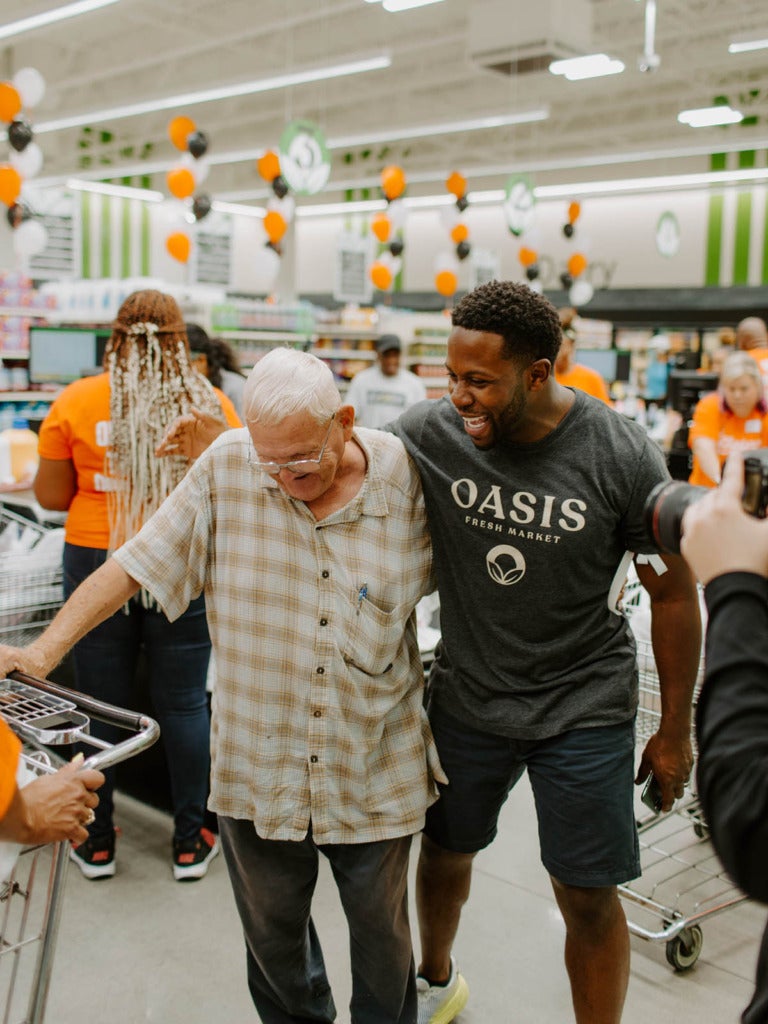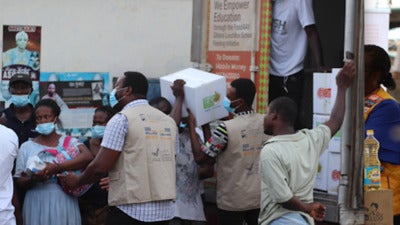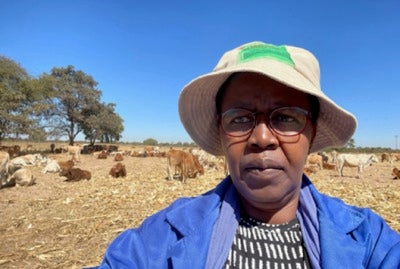The world is increasingly seeing the effects of a changing climate: floods in Europe, fires in the western United States, severe droughts in East Africa. Not only are these natural disasters upending cities and villages, but they are also upending our food systems. The impact of climate change coupled with an ever-growing world population positions food security as a foreboding crisis. Today, one in three people around the world does not have access to adequate food.
Despite the severity of the problem, there are glimmers of hope—people who fight against all odds to ensure that every person has access to the food they need. Local leaders and community-based organizations are at the forefront of these crises, serving as critical links between food–insecure individuals and nutritional resources. The Aspen Global Innovators Group supports two premier fellowships, the New Voices Fellowship and the Healthy Communities Fellowship, which bring expert viewpoints from Africa, Asia, Latin America, and underserved communities in the United States into the global conversation. Solving food security issues requires local, regional, and international action. And our fellows are working across all sectors to provide access to food for those most in need.
Providing Social Support at the Grocery Store
Aaron “AJ” Johnson, Healthy Communities Fellowship 2022

Aaron “AJ” Johnson hosts community events at Oasis Fresh Market in North Tulsa.
North Tulsa is a historically Black neighborhood in Oklahoma that was once known as “Black Wall Street.” Today, the majority of its residents are still Black. Upon learning that their life expectancy was 11 years shorter than the rest of the community, Aaron “AJ” Johnson launched a nonprofit called The Oasis Project, which provides various wrap-around services including rental and utility assistance, support for single parents, banking resources for individuals or businesses, workforce training, as well as diabetic and health-related classes. He also opened Oasis Fresh Markets, the first full-service supermarket in the neighborhood.
As a grocery store that provides fresh produce to the community, climate change is a challenge. From the disruption of goods due to water shortages in California to changes in soil patterns drying out vegetation, every day AJ sees how climate change is disproportionately harming underserved communities. These and inflation make it even more difficult for those who are economically constrained to buy the foods their families need.
These challenges have strengthened AJ’s belief in food justice. “The eradication of food deserts is key because everyone deserves fresh and healthy access,” he said. “It shouldn’t be a privilege but a right for everyone.” Learn more about Oasis Fresh Markets and find out how you can support AJ and the North Tulsa community.
Fighting Food Insecurity through Food Recovery
Elijah Amoo Addo, New Voices Fellow 2021
Elijah Amoo Addo is a Ghanaian celebrity chef and food stylist who has become a social entrepreneur through his
creation of Food for All Africa. Established in 2014, he started Food for All Africa which operates West Africa’s first and largest community food bank in Accra and hosts a satellite warehouse in the Ashanti region of Ghana. Elijah and his team create efficient and sustainable means of healthy nutrition for communities through advocacy, food recovery, and redistribution in cooperation with partners in adjacent sectors.

Elijah Amoo Addo distributes school lunches through Food4All Ghana.
Elijah is passionate about reducing food waste and sees his efforts as a way of combating climate change. The global food system currently contributes about one-third of greenhouse gas emissions. “Two-thirds of foods are lost and wasted from farm to table,” he said. “These losses, therefore, worsen climate change without improving food security or nutrition.”
Through Food for All Africa, Elijah has implemented large-scale solutions to food recovery and redistribution across Ghana. The food that is recovered in restaurants, hotels, and stores is repackaged and used for school lunch programs and monthly food bag distribution to vulnerable populations.
The main beneficiaries of the organization are children, older folks, and people with disabilities—especially those within communities that depend on donations for nutrition and livelihood support. Elijah offers feeding programs to over 100,000 beneficiaries and vocational training to at-risk Ghanaian youth.
Food for All Africa programs also include daily hot meals for those experiencing homelessness, and monthly food box or bag distribution to those incapable of working.
For Elijah, addressing the linkage between food security and climate change requires collective action. “Climate change is a threat multiplier for hungry and undernourished people,” he said. “Countries with high levels of hunger are often highly vulnerable to climate change and have a low capacity to adapt. Addressing food security challenges must therefore be a shared responsibility.”
Using Technology to Enable Access to Nutritional Food
Kwamane Liddell, Healthy Communities Fellow 2022
Kwamane Liddell is a health equity visionary and business leader who believes that food should be as accessible as medicine. While working as an emergency department nurse, Kwamane saw the devastation of hunger and food insecurity. He went on to found Nutrible, a technology platform that delivers affordable, diagnosis-based food directly to patients after they have been discharged from the hospital.
“When most people think about food insecurity, the first barriers that come to mind are economic,” Kwamane said “Although economic barriers are impactful, less than half of seniors who the USDA classifies as food insecure live below the poverty line. However, the vast majority of these seniors are food insecure because of geography or mobility issues. Climate change is creating a domino effect that will cause more people than ever to become food insecure in the US.”
Kwamane understands that anyone can become food insecure, especially those who are sick, elderly, or disabled. If you or a loved one needs information on ways to navigate food insecurity, please consider your local social services or visit nutrible.org.
Embracing Sustainable Livestock Production
Lindiwe Majele Sibanda, New Voices Fellow 2014

Lindiwe Sibanda in front of livestock at the University of Pretoria.
Lindiwe Majele Sibanda is an animal scientist and a practicing farmer. Last year, Lindiwe accepted an invitation from Nestlé to join their Board of Directors as she believes everyone, big business, farmers, policymakers, and academia have a role in delivering sustainable food systems. She serves as a policy advisor to numerous African governments and global institutions. Yet the work Lindiwe is most passionate about is her job as a livestock farmer and research director at the University of Pretoria’s Centre of Excellence in Sustainable Food Systems, which strives to find solutions to Africa’s food security challenges.
Lindiwe sees hope where others may not. She believes agriculture is both a cause of and a solution to climate change. “We can reduce greenhouse gasses from agriculture by adopting more sustainable production systems,” she said. “This is why research in climate change adaptation and mitigation is important”. Livestock production is much more than just meat production. Lindiwe knows that there are communities that need livestock for survival because it provides income, nutrition, drought power, and cultural significance to many communities around the world. She believes the global community must invest in sustainable agricultural production systems so that “sustainable livestock production can be a global cooling asset”.
Learn more about these fellows and how to support their work at: www.aspenglobalinnovators.org
This piece is part of In Focus: Rising to the Climate Challenge, a multimedia informational campaign that draws on the expertise of Institute programs. We look at four main facets of the climate change issue—labor and the economy, youth and education, public health and safety, and communities. To get campaign updates and other news from the Aspen Institute in your inbox, sign up for our newsletter.


